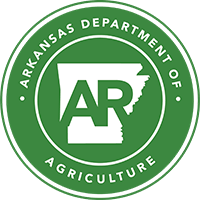Plant Industries
Serving the citizens of Arkansas and the agricultural and business communities by providing information and unbiased enforcement of laws and regulations set by the Arkansas State Plant Board
Agriculture / Plant Industries / Pesticide Section / Registration
Registration
The Registration Program is responsible for FIFRA Section 3 Registration, Section 18 Emergency Exemptions, Section 24(c) Special Local Needs Registrations, Section 2(ee) Recommendations, and Experimental Use Permits. The registration process helps insure that all pesticides used in Arkansas have been assessed for safety and efficacy by the EPA before they are distributed within the state.
Pesticide Resources
- Registered Pesticide Search - TEMPORARILY UNAVAILABLE
- Current 24c Registrations - TEMPORARILY UNAVAILABLE
- Approved Clomazone Tank-mixes for Aerial Application - Rice
The Arkansas Pesticide Control Act, Act 410 of 1975 gives the Arkansas State Plant Board (ASPB) the authority and responsibility to register all pesticides distributed, sold, or offered for sale within the State of Arkansas.
Pesticides are defined by the Arkansas Pesticide Control Act as:
- Any substance or mixture of substance intended for preventing, destroying, repelling, or mitigating any pest;
- Any substance or mixture of substance intended for use as a plant regulator, defoliant, or desiccant; and
- Any substance or mixture of substance intended to be used as a spray adjuvant;
Pesticides must be registered with the Pesticide Section of the Arkansas Department of Agriculture before they are distributed, sold, or offered for sale in Arkansas.
Pesticide Registration Process
Registrants are to submit the following items in order to register pesticide products in Arkansas. Pesticide registration can be submitted one of 2 ways:
BY MAIL:
1. Complete DP-21 Application for Registration of Pesticides form in duplicate.
2. Product label in PDF format. The electronic document name needs to include the complete product name and the EPA Registration Number. Labels may be submitted on a CD, emailed to pesticide.registration@agriculture.arkansas.gov, or submitted through ALSTAR (Accepted Labels State Tracking and Repository). New and Revised labels can also be submitted to the Department through ALSTAR. Labels are only required for new or revised labels.
3. A check for $250 per product exempt from the Abandoned Pesticide Disposal (APD) Fee, or a check for $320 for each product not exempt from the APD Fee.
OR
ONLINE SUBMISSION:
Instructions can be found at https://www.agriculture.arkansas.gov/plant-industries/pesticide-section/forms/ SCROLL ONLINE PAYMENT SECTION.
ONLINE PAYMENT LINK:
https://payments.statesolutions.us/?AID=63236C49690A4EF484D709986A07A969
In the product search bar, search DP-21, identify # of products to register, either Exempt from APD fee ($250) or Non-exempt from APD fee ($320). After the transaction is complete, click the green button for your receipt number and make sure you save a copy of the receipt. A receipt will not be emailed to you.
DP-21 ONLINE REGISTRATION FORM:
(This is for NEW Pesticide Registrations, for RENEWALS please email the pre-printed renewal form with receipt number included to pesticide.registration@agriculture.arkansas.gov confirmation email will be sent confirming submission of a DP-21 Registration Application for Pesticides.
DP-21 Application for Registration of Pesticides (For Use with Online Payment Only)
The Department does not require Material Safety Data Sheets, EPA Stamped Accepted Labels, or Confidential Statements of Formula unless specifically requested.
If you conduct registration activities for multiple companies, please use a separate DP-21 form for each company you wish to register.
Data Requirements
For Registration of products containing Quinclorac or Clomazone, for Agricultural Use the Department requires the formulations to undergo Droplet Testing by a third-party entity. Contact the Program Manager for Pesticide Registration for further information at (501) 225-1598.
Discontinuance of Registration
A 2- year discontinuance period is required for all products. This helps to ensure that any remaining product has a chance to work its way out of the channels of trade before the registration lapses. If the product is in its first year of discontinuance, then mark "D-1" or "D-2" for the second year of discontinuance at the end of the product name on the registration form. Registration fees are required for products within the discontinuance period.
A letter stating there is no product within the channels of trade in lieu of the discontinuance period is acceptable. The registrant is responsible for any unregistered products found within the channels of trade.
FIFRA Section 25(b) Exempt Products
Arkansas Pesticide Law requires the registration of all products making pesticidal claims. This includes products exempt from Section 3 Registration under FIFRA Section 25(b). Section 25(b) Exempt Products are registered in the same manner as other products.
Spray Adjuvants
Arkansas Pesticide law requires spray adjuvants to be registered as a pesticide. Spray adjuvants are defined as “…wetting agent, spreading agent, sticker, deposit builder, adhesive, emulsifying agent, deflocculating agent, water modifier, or similar agent intended to be used with any other pesticide to aid in the application…”
Restricted Use Pesticides
Certain pesticides, even when used in accordance with the label directions, still pose a hazard to the environment or human health. These pesticides are labeled by the EPA as Restricted Use Pesticides. The Plant Board may also place additional restrictions on pesticides under the Arkansas Regulations on Pesticide Classification if it is determined that the pesticide poses a hazard when used according to label directions.
The Pesticide Classification system allows the Plant Board to assign pesticides to different categories ranging from A to I. While most pesticides are categorized as Class A pesticides, the Plant Board can, through regulation change the classification of a product to place more restrictions on its use and distribution. These types of decisions are based on research findings, findings of other states or federal agencies, or the experience of the Plant Board and Department.
Pesticides registered in the State of Arkansas are listed as Class A with the exception of any 2,4-D, 2,4-D containing product, Class F, or Dicamba containing product, Class H, sold in containers more than one quart, Glyphosate which is Class G, and Facet which is Class I. Class F and Class H Pesticides are State Restricted. A license is required to distribute, sell, or purchase any pesticide with these classifications. To check whether a product is a State or Federally Restricted Pesticide use the Registered Pesticide Search tool.
Arkansas Regulations on Pesticide Classification
The Department follows EPA criteria for Section 2(ee) Recommendations, and must approve all written Section 2(ee) Recommendations. This allows the registrant to recommend the use of a product that is labeled for use on a particular crop, animal, or site in a manner not permitted by the labeling, as long as that use is not specifically prohibited by the label. Such recommendations include reduced use rates, mixing with other pesticides or fertilizer, alternate methods of applications, and targeting pests not listed on the label.
Section 24(c) Registration
FIFRA Section 24(c) allows states to register an additional use of a federally registered pesticide or a new end use product to meet special local needs. The Department, working in conjunction with the University of Arkansas Cooperative Extension Service, will determine that a need does exist, that the applicant meets all federal requirements for registration of a pesticide, that the requested use of the pesticide has not been previously denied, suspended, or cancelled by the EPA, and the products efficacy data supports the claims made for it before the application will be approved.
All Section 24(c) Registrations must be accompanied by a DP-21 Application for Registration of Pesticides form and a $250 registration fee. This applies to all Section 24(c) Registrations, including those for products already registered in the State of Arkansas.
Section 18 Emergency Exemptions
A Section 18 Emergency Exemption from Registration is designed to provide temporary relief for growers or producers that when they encounter a pest that cannot be controlled by pesticides currently registered for a crop/use site. In situations where Arkansas's producers need pesticides to control an unusual or unexpected pest the Department can petition the EPA for a Section 18 Emergency Specific Exemption, or in extreme cases a Crisis Exemption.
Requirements
In order to be considered for a Section 18, the situation must meet certain criteria:
The problem has to be both urgent and non-routine. Basically an emergency, a situation that has to be addressed immediately and which was not expected to occur in the first place.
The problem must be one that cannot be controlled with the pesticides already registered for the crop in question.
There must also be a threat of significant economic loss to the farmer.
Unless these three conditions are met, and can be documented, the situation does not qualify under Section 18.
Notice of Exemption
If EPA approves the Section 18, the Department sends out a Notice of Exemption to applicators, dealers, and the University of Arkansas Cooperative Extension Service. These notices and the manufacturers labeling make up the legal label for the pesticide during the allowed time for the Section 18.
The Notice of Exemption contains information specific to the use of a pesticide under a Section 18 exemption. It will indicate application sites, application rates, special warnings, use restrictions, and reporting requirements. This is the only place that some of this information will be available.
Duration
Section 18's are good for a specific period of time, usually less than a year. If the emergency continues into the next growing season a new Section 18 is needed and the process starts all over again. It is important to note that since Section 18's are renewed annually, the labeling can change each year. Current Section 18 Exemptions are listed at the top of the page.
Reporting
State and Federal Law require all pesticide applications made under Section 18 to be reported to the Department within ten days of application using the Section 18 Application Report form. Located at the bottom of each Notice of Exemption is a list of information which must be reported to the Department. It includes applicator's name and address, farmer's name and address, acres treated, pounds of active ingredient per acre, location of field, and time and date of application.

